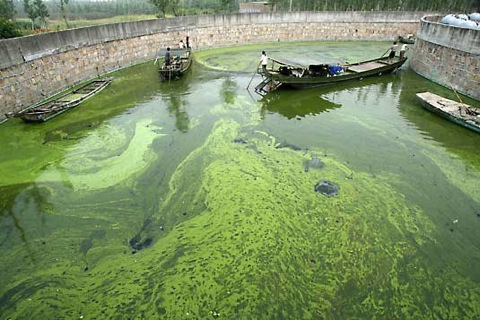Algae to the rescue
5 Nov, 2009 04:19 pm
I?m more convinced than ever that liquid fuels from algae will be a major component of our energy and environmental future. A good reason why I say this is alluded to by the article, Engineers Strive To Make Algae Oil Production More Feasible...
 |
“It will take that much time to really understand the fundamentals of large-scale algae production and to establish pilot projects,” he said.
Both Yuan and Pei, professor of industrial and manufacturing systems engineering at K-State, think food production land should not be used to produce algae for fuel. The two are studying the feasibility of large-scale algae production in the ocean and how to engineer the production systems.
A few observations:
Algae-based liquid vehicle fuel at $5/gallon in five to ten years will be an enormous bargain. The odds are very good that in that time frame we’ll be enduring higher and much more volatile oil prices than we’re experiencing right now, so any technology that can deliver virtually zero net carbon fuel at a stable price of “only” $5/gallon will be more attractive than [politically incorrect metaphor]. Again, we can’t look at just peak oil or climate change in isolation, if for no other reason than they aren’t isolated from each other in the real world. They will interact, sometimes in distinctly inconvenient ways, regardless of whether we choose to see those interactions ahead of time.
Reducing the cost of production is a relatively tractable problem. For example, the steps needed to get from where we are now with algae biofuels to that magical $5/gallon price point are much simpler (to over simplify things a bit) than are the steps needed to make hydrogen fuel cell vehicles a commercial success. Hydrogen is up against some inflexible constants, like the amount of energy needed to create, compress, transport, and dispense the fuel. (And that’s making the very generous assumption that the astronomical cost of fuel cells that operate in the environmental conditions we subject motor vehicles to can be brought under control.)
All of this points to something I’ve been saying for some time: We’re about to see a fragmentation and specialization of transportation technology. For a long time in the US cars and light trucks (SUV’s, minivans, and pickup trucks) have been almost universally powered by gasoline, with larger trucks being diesel. We started to fragment the market with the introduction of flex fuel vehicles and hybrids, and to a very minor extent with natural gas vehicles and battery electrics.[1] Expect to see this mix of vehicles and fuels to become far more diverse in the coming years. If nothing else, we’ll see millions of US households with one ICE vehicle (possibly a plug-in hybrid running on algae-derived fuel) and one full-on electric.
[1] According to Table 6.1 of the Transportatoin Energy Databook, in 2007 the US had 695,766 alternative fueled vehicles on the road, including 275,426 CNG, LPG, or LNG, 364,384 E85 (which includes on those E95 capable vehicles actually run on E85), 55,730 electrics, and 223 hydrogen.
Originally published on The Cost of Energy
-
12/12/12
“Peak Oil” is Nonsense… Because There’s Enough Gas to Last 250 Years.
-
05/09/12
Threat of Population Surge to "10 Billion" Espoused in London Theatre.
-
05/09/12
Current Commentary: Energy from Nuclear Fusion – Realities, Prospects and Fantasies?
-
04/05/12
The Oil Industry's Deceitful Promise of American Energy Independence
-
14/02/12
Shaky Foundations for Offshore Wind Farms
2 comment(s)
[1]
Comment by Ross
6 Nov, 2009 12:19 pm
Algae biofuels definately have great potential once sustainable large-scale production methods can be defined. They also present a great alternative to 1st-generation CCS schemes - why bury carbon dioxide underground when you can use it to grow algae more effectively!
 Alert Moderator
Alert Moderator
[2]
Comment by Durwood M. Dugger
6 Nov, 2009 04:59 pm
Your economic comparison between hydrogen fuel production and algae fuel production - seem to reflect your greater knowledge of hydrogen production economics - rather comparable economic understandings of both - needed for insightful analysis. The bulk of algae fuel costs are not in producing the algae, but in processing the produced algae into a cost efficient fuel. Many of those costs are high energy processes that are no more flexible than those in hydrogen production costs. Equally, as important is an understanding of petroleum production costs and its market place. Current petroleum costs are far below market prices - as they always have been. Some very new near surface, premium quality fields just starting production in Iraq (possibly larger than Saudi Arabia's reserves) were reported by Business Week and several other pubs this past summer to be under $2.50/barrel. I have never favored price controls, but unless energy prices are legislated, it will be a very long time before alternative energy will be able to compete economically with petroleum - and even longer before it is allowed by the petroleum industry to compete. While Peak Oil is undeniable - you might note that the date of global petroleum production peak - keeps being moved further and further into the future as new finds keep adding to current reserves. Economically feasible alternative fuel development is far more complex than the popular media cares to provide coverage of to the average reader.
 Alert Moderator
Alert Moderator






